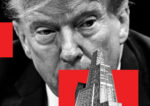Former President Donald Trump faces a potential tax bill exceeding $100 million after what the IRS deemed a questionable accounting tactic related to his Chicago tower, the New York Times reported, citing an investigation by ProPublica.
The scrutiny centers on Trump’s 92-story hotel and condo tower along the Chicago River, his most-recent major construction venture. The tower was plagued by financial woes upon completion during the Great Recession, with condo sales falling far below expectations. Seeking tax benefits from these losses, Trump allegedly claimed write-offs totaling $651 million in 2008, citing his investment as “worthless” due to insurmountable debts.
In 2010, Trump orchestrated a maneuver involving the tower’s ownership restructuring, resulting in additional claimed losses of $168 million over the following decade. That move prompted an extensive IRS inquiry, with experts estimating a potential tax liability exceeding $100 million if Trump loses the audit battle.
The tax dispute sheds light on Trump’s ongoing clash with the IRS, a saga that began during his presidency, when the agency launched a high-level review into his tax affairs. The dispute has far-reaching implications, not only for Trump but also for wealthy individuals navigating partnership tax laws, which are notoriously complex and often exploited through aggressive accounting strategies.
“This matter was settled years ago, only to be brought back to life once my father ran for office,” said the former President’s son Eric, who is executive vice president of the Trump Organization. “We are confident in our position, which is supported by opinion letters from various tax experts, including the former general counsel of the IRS.”
But critics argue that his Chicago accounting maneuvers are dubious at best. Tax professionals consulted for the investigation suggested Trump may have pushed beyond defensible limits in claiming tax benefits.
Trump’s tax records have long been a subject of scrutiny, dating back to his 2016 presidential campaign, when he refused to release them, citing an ongoing audit. Subsequent revelations, including a disputed $72.9 million tax refund in 2020, have fueled speculation and legal battles over his financial affairs.
Beyond the IRS audit, Trump faces mounting legal challenges, including defamation and fraud lawsuits, with recent judgments totaling over $500 million, and the alleged hush-money criminal trial against him underway in Manhattan.
Trump struck a deal in 2001 to acquire the site of his Chicago tower, envisioning it as a centerpiece of architectural excellence. However, cost overruns and economic downturns dashed those hopes, leaving Trump with substantial losses.
The IRS’ investigation is among several challenges facing Trump’s Chicago tower. Last month, a watchdog group claimed he made “material false statements” regarding a $50 million loan tied to the skyscraper.
Last year, Illinois Attorney General Kwame Raoul amended a 2018 lawsuit accusing the building’s owners of operating a cooling water system without the required permits, and of underreporting water discharge levels into the river. In addition, the attorney general’s office alleges that the building owners have been discharging water into the river without a National Pollutant Discharge Elimination System permit, which is mandated by federal law.
Two environmental groups, Sierra Club and Friends of the Chicago River, sued Trump’s company last year, claiming that the tower is in violation of the federal Clean Water Act. It was the second lawsuit that the groups had filed against Trump in five years.
—Quinn Donoghue
Read more


